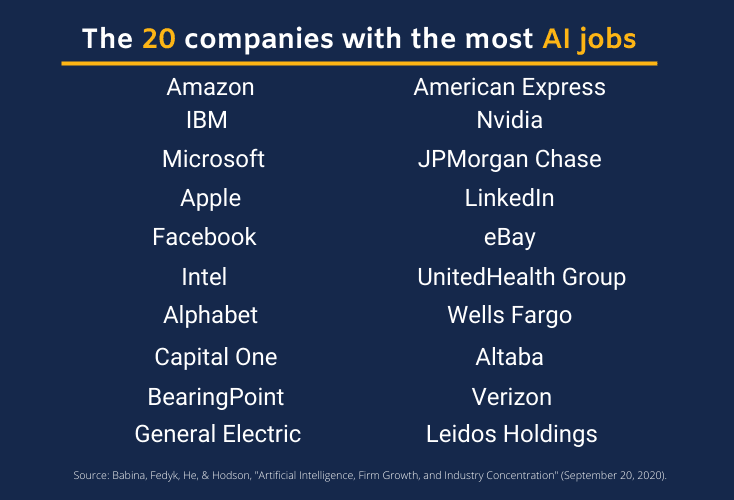
Large companies with their greater resources have a natural advantage when it comes to investing in artificial intelligence. Those investments, in turn, help those large companies to grow even larger—creating a virtuous circle that leads to even greater market dominance.
In short, AI has helped “superstar” firms such as Amazon, JPMorgan Chase, and UnitedHealth, get even bigger, according to a new paper co-authored by Berkeley Haas Assistant Professor Anastassia Fedyk.
“AI investments have been concentrated in large firms that were already productive, enabling those firms to grow even larger and capture even more market share,” Fedyk said. “By facilitating the rise of the ‘superstar’ firms, the new technology is leading to increases in industry concentration.”
Along with co-authors Tania Babina, an assistant professor at Columbia Business School; Alex He, an assistant professor at the University of Maryland; and James Hodson, the CEO of the AI for Good Foundation, Fedyk found that firms that invested more in AI technology increased their sales and employment, leading to higher levels of industry concentration.
“We wanted to look at whether this recent technological change adopted by firms led to something concrete,” Fedyk said. “Is it the case that modern technology is improving firm productivity and stimulating growth?”
The answer to that was mixed, they found.
Analyzing AI job postings and resumes
AI technologies, such as machine learning or natural language processing, rely on computer science to simplify tasks involving decision-making or forecasting. Because AI relies on big datasets, it’s possible that larger firms have an advantage because they have more data and can more efficiently tailor products to different consumers. Moreover, this streamlined technology may simplify production, resulting in higher firm productivity.
Quantifying how AI affects the economy has been difficult because there is little data on individual firms’ AI usage. Fedyk and her coauthors overcame this challenge by using online job postings and employee resume data to look at how many of the firms’ job postings or workers had AI-related skills and create an index of companies’ use of AI.
The researchers then looked at the types of companies that use AI technology. They found higher investments in AI by “superstar” firms—those with larger market shares, higher cash reserves, and higher R&D intensity. The ten firms with the most AI jobs were Amazon.com Inc., International Business Machines Corp. (IBM), Microsoft Corp., Apple Inc., Facebook Inc., Intel Corp, Alphabet Inc., Capital One Financial Corp., multinational consulting firm BearingPoint Inc., and General Electric Co. However, the rise in AI investments from 2010 to the present has been ubiquitous across all industry sectors, with roughly a sixfold increase in the share of AI workers across the board.

Growth for the largest firms
In terms of economic growth, the researchers found that companies investing more in AI technology had higher growth rates from 2010 to 2018. A one-standard-deviation increase in the share of AI workers was associated with a 16% growth in sales, and, interestingly, a 15% increase in employment. The researchers note that this last finding assuages some of the conventional concern that AI technology might destroy more jobs than it creates.
Unlike the adoption of robots, which other studies have found increases employment at the firm level but decreases employment at the industry level, Fedyk found that firm-level growth from AI investments did translate into industry-level growth in sales and employment. In other words, firms benefitting from AI did not, in general, do so at the expense of other companies within their industry.
The researchers concluded that the findings were driven by firms that were already larger and more productive before the adoption of AI. For instance, the largest third of companies increased sales by 17%, while the smallest third of companies saw no increase at all. Moreover, the large firms that adopted AI simultaneously expanded into new geographic and product markets. The researchers interpret these results as evidence that AI has helped the most productive firms scale more efficiently.
Fedyk points out that while this growth has led to greater market concentration towards the largest firms, that’s not necessarily a bad thing, as more market share is being allocated to more productive firms.
At the same time, there was no evidence that AI-adopting firms became more productive as a result of the technology. However, the researchers cautioned that productivity gains may take some time to materialize. “It’s still early on as AI hasn’t been around for that long,” Fedyk said. “It’s possible that it will take longer to see improvements in efficiency.”